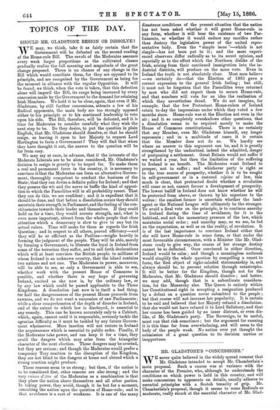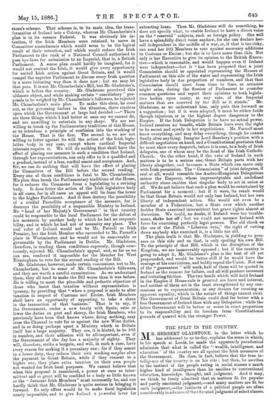MR. GLADSTONE'S "CONCESSIONS."
WE never quite believed in the widely spread rumour that Mr. Gladstone intended to accept Mr. Chamberlain's main proposal. Such a course was at variance with the character of the Premier, who, although he understands the conditions on which power is held in this country, and will make concessions to opponents on details, usually adheres to essential principles with a Scotch tenacity of grip. Mr. Chamberlain's proposal, though it seems to some Radicals so moderate, really struck at the essential character of Mr. Glad-
stone's scheme. That scheme is, in its main idea, the trans- formation of Ireland into a Colony, whereas Mr. Chamberlain's plan is in its essence Federal. It was obviously his in- tention, if the Irish Members were retained, to move in Committee amendments which would seem to be the logical result of their retention, and which would reduce the Irish Parliament to the rank of a National Council authorised to pass bye-laws for submission to an Imperial, that is, a British Parliament. A worse plan could hardly be imagined, for it would not content the Irish, it would give every opportunity for united Irish action against Great Britain, and it would compel the superior Parliament to discuss every Irish question in a more irritating way than it does now ; but we may let that pass. It is not Mr. Chamberlain's Bill, but Mr. Gladstone's, which is before the country. Mr. Gladstone perceived this ultimate object, and while making certain " conciliatory " pro- posals to be weighed by Mr. Chamberlain's followers, he rejected Mr. Chamberlain's main plan. To make this clear, he read out, as the governing factors in the situation, three resolves upon which the Government at large had decided There are three things which I had better at once say we cannot do, and are unwilling to entertain in any shape. We are not willing to break up the Parliamentary traditions of this House, or to introduce a principle of confusion into the working of the House. That is the first. The second is, we are not willing to fetter against its will the action of the Irish legis- lative body in any case, except where cardinal Imperial interests require it. We will do nothing that shall have the effect of placing our measure in such a condition that Ireland, through her representatives, can only offer to it a qualified and a gradual, instead of a free, cordial assent and acceptance. And, Sir, we can do nothing that will have the effect of placing the Committee of the Bill before the second reading." Every one of these conditions is fatal to Mr. Chamberlain. His plan does break the Parliamentary traditions of the House, for it reduces the Commons from a legislating to a revising body. It does fetter the action of the Irish legislative body in all cases, for in all cases an appeal will lie from the lower to the higher Parliament. And it does destroy the possibility of a cordial Parnellite acceptance of the measure, for it destroys the possibility of a responsible Ministry in Ireland. No " head of her Majesty's Government " in that country could be responsible to the local Parliament for the defeat of his measures by another body to which he had no responsi- bility, and in which he had not of necessity any place. The real ruler of Ireland would not be Mr. Parnell as Irish Premier, but the Irish Member who succeeded to Mr. Parnell's place in Westminster, and ho would not be removeable or governable by the Parliament in Dublin. Mr. Gladstone, therefore, in reading these conditions expressly, though cour- teously, rejected Mr. Chamberlain's appeal, and, so far as we can see, rendered it impossible for the Member for West Birmingham to vote for the second reading of the Bill.
Mr. Gladstone, however, made certain concessions, not to Mr.
Chamberlain, but to some of Mr. Chamberlain's followers, and they are worth a careful examination. As we understand them, they all tend to make the Bill worse than it was before.
He is willing to meet the plausible and pedantic objection of those who insist that taxation without representation is tyranny, by providing that " when a proposal is made to alter taxation in respect of Customs and Excise, Irish Members shall have an opportunity of appearing, to take a share in the transaction of that business." That is to say, if the Government, under a new treaty with Spain, raise or lower the duties on port and sherry, the Irish Members, who previously have been God knows where, doing nothing, may cross the Channel to vote for or against the new Wine duties, and in so doing perhaps upset a Ministry which in Britain itself has a large majority. They are, it is hinted, to be 103 in number, and their adhesion will be all-important, even if the Government of the day has a majority of eighty. They will, therefore, strike a bargain, and will, in such a case, have
every reason for making it a pecuniary one ; for if they assent to a lower duty, they reduce their own working surplus after
the payment to Great Britain, while if they consent to a higher one, they place extra taxation on their own people not wanted for Irish local purposes. We cannot believe that when this proposal is considered, a power at once so inter- mittent and so great will be confided to a body so little known as the "dormant Irish Members" must necessarily be, and can hardly think that Mr. Gladstone is quite serious in bringing it forward. Its only effect would be to make fiscal legislation nearly impossible, and to give Ireland a powerful lever for extracting loans. Then Mr. Gladstone will do something, he does not specify what, to enable Ireland to have a direct voice on the "reserved" subjects, such as foreign policy. She will have a splendidly direct voice anyhow, for she can declare her- self independent in the middle of a war, or, if that is too risky, can send her 103 Members to vote against necessary additions to Customs or Excise ; but she is to have more than this. Not only is her Executive to give its opinion to the British Execu- tive—which is reasonable, and would happen even if Ireland were independent—but it " has been proposed that a joint Commission should be appointed representing the Houses of Parliament on this side of the water and representing the Irish legislative body in due proportion of numbers, and that that Commission should meet from time to time, as occasion might arise, during the Session of Parliament to consider common questions and report their opinions to both legisla- tive bodies upon many, at any rate, of the Imperial matters that are reserved by the Bill as it stands." Mr. Gladstone, as we understand him, only puts this forward as a suggestion ; but if it were adopted, it must be either futile though injurious, or in the highest degree dangerous to the Empire. If the Irish Delegation is to have no actual power, Ireland receives no benefit, while Britain loses even the right to be secret and speedy in her negotiations. Mr. Parnell must know everything, and may delay everything, though he cannot finally alter anything. Imagine Lord Rosebery's position with a difficult negotiation on hand, and a Constitutional provision that he must show every despatch, before it is sent, to a body of Irish delegates, one of whom may be the head of the Irish Catholic Church. On the other hand, if the veto of Ireland in such matters is to be a serious one, Great Britain parts with her liberty altogether, and becomes a State which can move only with Irish permission. The " Commission " of joint delegates, if real at all, would resemble the Austro-Hungarian Delegations minus the Emperor, whose imprescriptable and undefined authority alone enables that singular body to act in union at all. We do not believe that such a plan would be entertained by Parliament for a moment ; but if it were, its result would be that Great Britain would not only lose Ireland, but her own liberty of independent action. She would not even be a member of a Federation, but a Stato over which another feebler State exercised intermittent but grave rights almost at discretion. We could, no doubt, if Ireland were too trouble- some, shake her off ; but we mid not menace Ireland with force for exercising perfectly legal powers. The old check on the use of the Polish " Liberum veto," the right of cutting down anybody who exercised it, is a little too old.
The plain truth is that Mr. Gladstone, in yielding to pres- sure on this side and on that, is only spoiling his own Bill. To the principle of that Bill, which is the disruption of the Kingdom, we are immoveably opposed ; but if the country is going to adopt it, Mr. Gladstone's plan is the best of all yet propounded, and would be better still if he would have the courage of his convictions, and boldly repeal the Union. Not one of the " guarantees " will work, half of them will be quoted in Ireland as the reasons for failure, and all will produce incessant and irritating friction. The two bonds which will hold Ireland in the Empire if Home-rule is granted are force and interest, and neither of them are in the least strengthened by any con- cessions as to representation, or any devices for creating an apparent equality, which in the nature of things cannot exist. The Government of Great Britain could deal far better with a free Government of Ireland than with any Delegation ; while the latter Government will be better or worse in exact proportion to its responsibility and its freedom from Constitutional grounds of quarrel with the stronger Power.



































 Previous page
Previous page